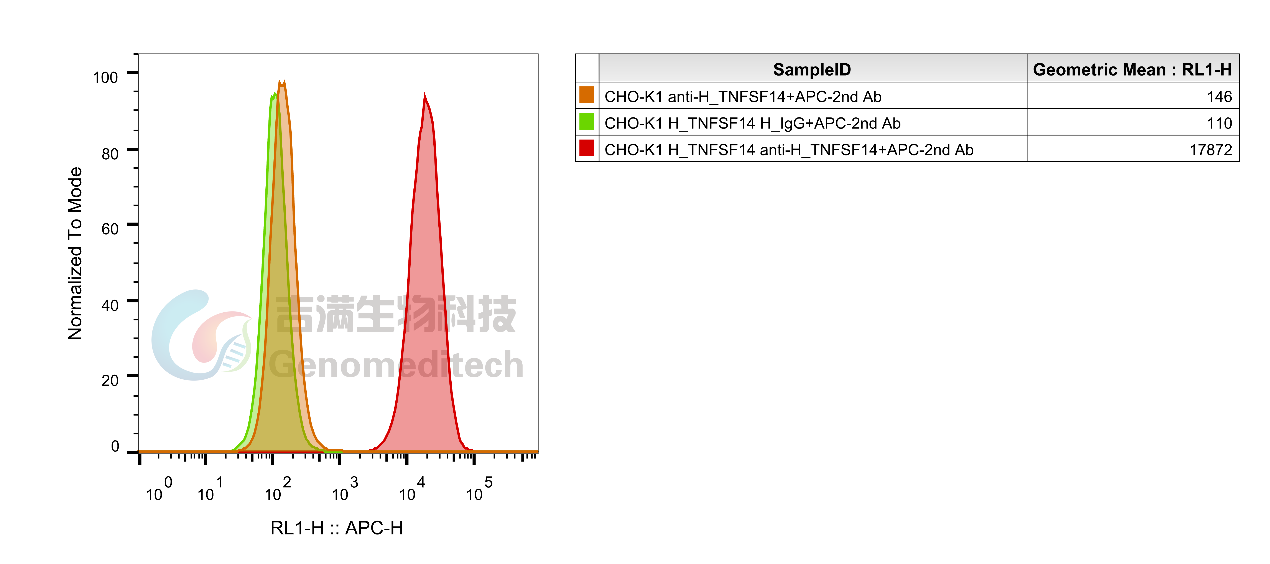Cat.No:GM-30127AB
Product:Anti-TNFSF14 hIgG4 Antibody
Cat.No:GM-30127AB
Product:Anti-TNFSF14 hIgG4 Antibody
GM-30127AB-10 10 μg
GM-30127AB-100 100 μg
GM-30127AB-1000 1 mg
Species Reactivity Human
Clone /
Source/Isotype Monoclonal Human IgG4 /κ
Application Flow Cytometry
Specificity Detects TNFSF14
Gene TNFSF14
Other Names LTg; CD258; HVEML; LIGHT
Gene ID 8740
Background Tumor necrosis factor superfamily member 14 (TNFSF14), also known as LIGHT, is a secreted protein of the TNF superfamily. The protein encoded by this gene is a member of the tumor necrosis factor (TNF) ligand family. This protein is a ligand for TNFRSF14, which is a member of the tumor necrosis factor receptor superfamily, and which is also known as a herpesvirus entry mediator (HVEM). Two alternatively spliced transcript variant encoding distinct isoforms have been reported. This protein may function as a costimulatory factor for the activation of lymphoid cells and as a deterrent to infection by herpesvirus. This protein has been shown to stimulate the proliferation of T cells, trigger apoptosis of various tumor cells and play a role in vascular normalisation processes. This protein is also reported to prevent tumor necrosis factor alpha-mediated apoptosis in primary hepatocytes.
Storage Store at 2-8℃ short term (1-2 weeks).Store at ≤ -20℃ long term. Avoid repeated freeze-thaw.
Formulation Phosphate-buffered solution, pH 7.2.
Endotoxin < 1 EU/mg, determined by LAL gel clotting assay

Cat.No:GM-30127AB
Product:Anti-TNFSF14 hIgG4 Antibody
GM-30127AB-10 10 μg
GM-30127AB-100 100 μg
GM-30127AB-1000 1 mg
Species Reactivity Human
Clone /
Source/Isotype Monoclonal Human IgG4 /κ
Application Flow Cytometry
Specificity Detects TNFSF14
Gene TNFSF14
Other Names LTg; CD258; HVEML; LIGHT
Gene ID 8740
Background Tumor necrosis factor superfamily member 14 (TNFSF14), also known as LIGHT, is a secreted protein of the TNF superfamily. The protein encoded by this gene is a member of the tumor necrosis factor (TNF) ligand family. This protein is a ligand for TNFRSF14, which is a member of the tumor necrosis factor receptor superfamily, and which is also known as a herpesvirus entry mediator (HVEM). Two alternatively spliced transcript variant encoding distinct isoforms have been reported. This protein may function as a costimulatory factor for the activation of lymphoid cells and as a deterrent to infection by herpesvirus. This protein has been shown to stimulate the proliferation of T cells, trigger apoptosis of various tumor cells and play a role in vascular normalisation processes. This protein is also reported to prevent tumor necrosis factor alpha-mediated apoptosis in primary hepatocytes.
Storage Store at 2-8℃ short term (1-2 weeks).Store at ≤ -20℃ long term. Avoid repeated freeze-thaw.
Formulation Phosphate-buffered solution, pH 7.2.
Endotoxin < 1 EU/mg, determined by LAL gel clotting assay
